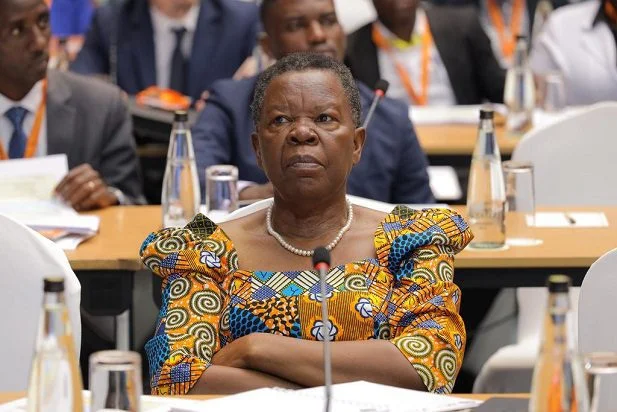Uganda’s entertainment industry is rapidly growing and becoming a key contributor to the country’s economy. From music concerts to film production and cultural performances, the sector provides a source of income for many, especially the youth.
According to industry estimates, Uganda’s creative sector, including music, film, and art, generates billions of shillings annually. However, despite its potential, there has been limited investment from the government in developing the infrastructure necessary to support this thriving sector.
A Call for Government Investment in Entertainment
Victoria Ssekitoleko, a member of the Private Sector Foundation Uganda, recently highlighted the need for the Ugandan government to invest in the entertainment industry.
Speaking at the 7th High-Level Economic Growth Forum at Serena Hotel in Kampala, she pointed out that the entertainment sector has largely been ignored in terms of government support, despite its potential to significantly boost revenue.
Ssekitoleko argued that instead of focusing solely on a small group of taxpayers, the government should turn its attention to the entertainment industry, which has the capacity to generate substantial tax revenue.
She emphasized that creating designated spaces for performances and events would allow youth involved in the creative industry to flourish.
The Youth and the Creative Sector
One of the main points Ssekitoleko raised was the involvement of Uganda’s youth in the entertainment industry. She questioned why there is so little attention given to this sector during high-level government discussions, despite its importance.
Most young people in Uganda are engaged in the creative and innovation sectors, including music, film, and performing arts. Yet, government policies often overlook this demographic.
Ssekitoleko stated, “I find it interesting when we sit here and pretend like we don’t see what is happening. If you are to be asked, where are all the youth now? Most of them are in innovation and creative sectors, but it is never mentioned.”
The creative industry, particularly music, has demonstrated the capacity to generate large sums of money in a short period of time.
Musicians in Uganda can earn substantial amounts from concerts and events, but there is little to no support in terms of infrastructure, such as concert venues and performance spaces.
The Case for Supporting Music and Performances
To emphasize her point, Ssekitoleko cited the recent concert held by Ugandan musician Alien Skin at Freedom City, which saw fans fighting to buy tickets.
She argued that every ticket sold contributes to tax revenue, yet the government has not provided adequate spaces for musicians and other entertainers to perform.
She added that places like Lugogo Grounds, which could be used for such events, are only available a few times a year, limiting opportunities for performers.
Ssekitoleko also mentioned another artist, Ronald Alimpa, who became famous for his song “Lusuku lwa Cementi.” While the artist earned a significant income from the song, the owner of the banana plantation featured in the music video likely did not earn anywhere near the same amount, showcasing the financial disparity in the sector and the need for better planning.
Government’s Response and the Emyooga Project
In response to Ssekitoleko’s concerns, Moses Kaggwa, Director of Economic Affairs at the Ministry of Finance, Planning, and Economic Development, acknowledged that the government is aware of the challenges facing the youth in the creative sector.
He encouraged young people to seek funding through the Emyooga project, a government initiative designed to provide financial support to individuals in various sectors, including the creative arts.
Kaggwa admitted that while the Emyooga program has provided some funding, many youth have complained that the funds are not enough to support their careers fully.
He reassured the public that the government is considering increasing funding for the project to help creative professionals further their careers.
Expanding the Creative Industry’s Potential
With proper investment and support, Uganda’s entertainment industry could become one of the country’s major revenue generators.
Developing infrastructure such as concert halls, theaters, and art spaces would not only help local artists showcase their talents but also attract international acts and tourism, boosting the economy.
In countries like Nigeria and South Africa, where the entertainment industry has been well-supported by both the private and public sectors, the industry contributes significantly to the national GDP.
Uganda could follow in their footsteps by investing in this sector to reduce unemployment among the youth and provide more income-generating opportunities.
The Economic Impact of the Entertainment Industry
According to global studies, entertainment industries can play a pivotal role in driving economic growth. In Uganda, the entertainment and creative sector already provides thousands of jobs.
From musicians and actors to event organizers and technicians, the ripple effect of this industry extends far beyond the performers themselves. By building performance venues and fostering an environment that encourages creativity, Uganda can unlock the full potential of its entertainment sector.
Conclusion
The entertainment industry in Uganda is full of untapped potential. With a growing number of young people involved in creative arts, it is time for the government to shift its focus toward supporting this sector.
Investing in infrastructure and offering financial support through programs like Emyooga will allow the creative industry to thrive, generating significant revenue and employment opportunities for the country.
It is clear that with the right policies and investment, Uganda’s entertainment sector could become a key player in the country’s economic growth.
Rather than overlooking this important industry, it is time for the government to recognize its value and provide the necessary support to ensure its continued expansion.




















